Trump posted a photo of me sitting by my tent - then a bulldozer arrived
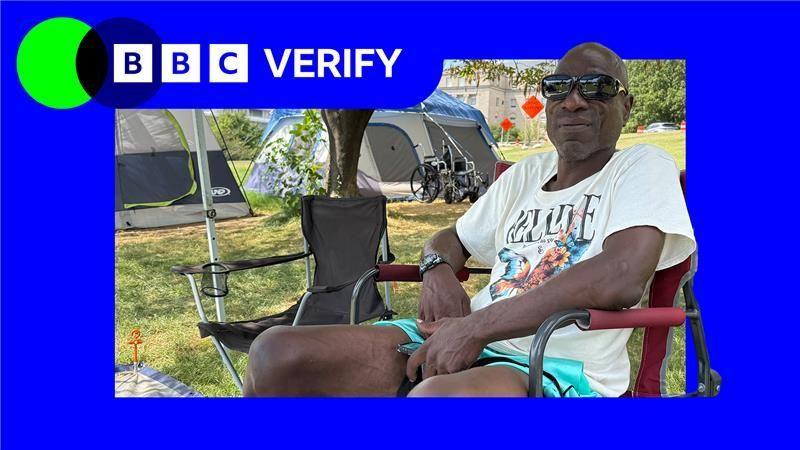
- Published
US President Donald Trump was riding along in his motorcade through Washington DC last Sunday on the way to his golf club when he saw something that clearly irked him - a homeless tent encampment on a patch of grass.
"The Homeless have to move out, IMMEDIATELY," he posted on Truth Social that morning, along with four photos.
One of these showed a man sitting in a camping chair by his tent, who I would eventually learn was Bill Theodie. Four days later, Mr Theodie was forced to move after the president announced a crackdown on homelessness in the nation's capital.
"That's me," he said when I showed him the photo Trump posted, which was the first time he had seen it.
"That is insane that he just leaned out the window and takes a picture of me and then posts it on social media in a negative way, using it as his political tool."
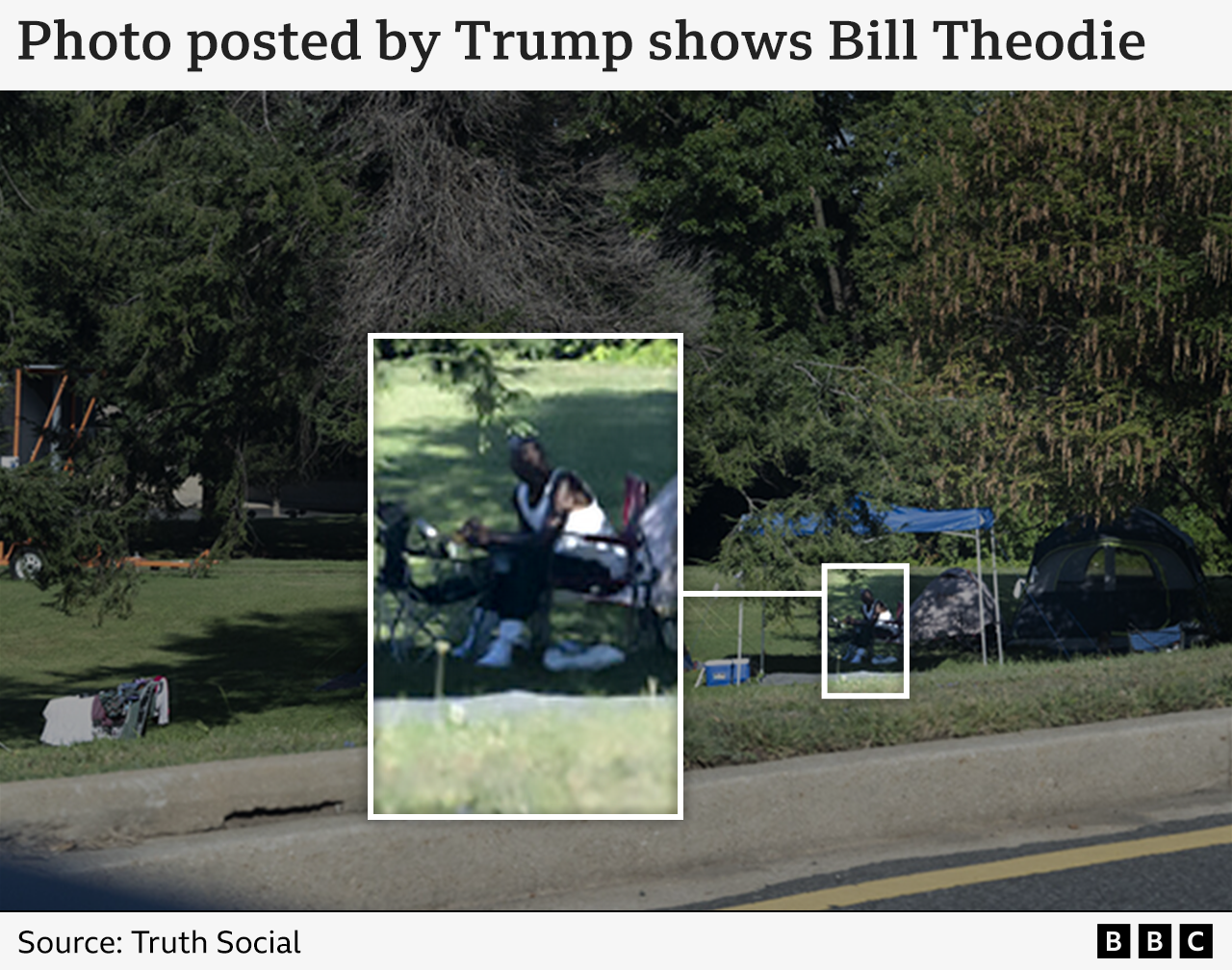
On Monday, Trump announced his administration would be "removing homeless encampments from all over our parks, our beautiful, beautiful parks".
"We have slums here, we're getting rid of them," he said from behind the podium in the White House press room.
After the announcement, BBC Verify decided to investigate the photos that the president had posted.
We matched visual clues in the pictures of the tents - including a bend in the road alongside the grassy area where they were pitched - to a location on Google streetview.
Watch: How Trump’s drive to his golf course shaped homeless crackdown in Washington DC
The encampment was about a 10-minute drive from the White House, and less than that from the BBC office in Washington - so I headed down there to see what had happened to the site that had caught the president’s attention.
When I arrived local officials were there warning people they could soon be forced to move.
I also found Mr Theodie, a 66-year old from Missouri, sitting in the same camping chair.
He had seen Trump drive by before.
"The president's motorcade is pretty long," Mr Theodie said. "I've seen it coming through here three times."
"You know, I understand he doesn't want to see mess, that's why we go out of our way to maintain it clean. We're not trying to disrespect the president or any other person who comes by."
He told me he had been living at the site for years and works in construction, though he's been out of full-time employment since 2018. Normally, he can pick up just a few shifts a month.
On Thursday, Mr Theodie and the other residents there were told to pack up and leave immediately.
A local reporter filmed as a bulldozer was sent in to dismantle tents and other belongings people left behind.
Watch: homeless encampment in Washington DC destroyed after Trump order
"They said you need to pack it up or they are going to bulldoze it. They didn't come for talking, it was go, go, go," Mr Theodie said.
Wayne Turnage, the deputy mayor of the DC Department of Health and Human Services, said city authorities have removed encampments across the capital before.
This is usually done with at least a week's notice, he said, but the process has been fast-tracked following Trump's announcement.
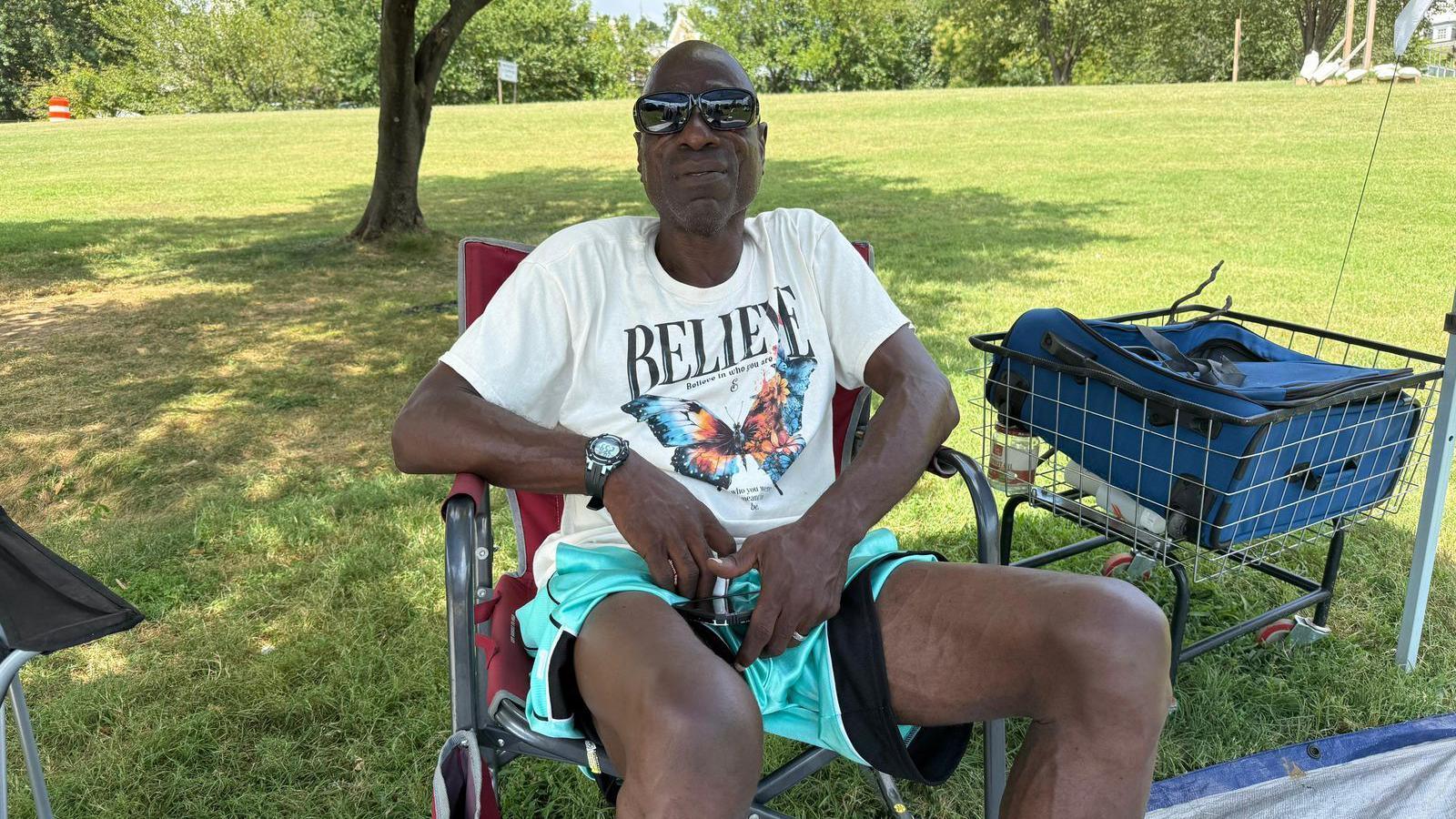
Mr Theodie says he doesn't feel safe sleeping in a shelter
The homeless encampment was the largest in the city, according to the local authority - with 11 people living next to one of the main routes out of Washington DC.
Before the latest crackdown, there were 97 people living in homeless encampments in the city this year, a big drop from 294 in 2023, the figures show.
The estimated number of people experiencing homelessness is 5,138 this year, down from 5,613 in 2024, according to the city's yearly snapshot, external.
The latest data from the Community Partnership, external, an organisation that works to reduce homelessness, shows about 800 people are unsheltered, while about 4,300 others have some sort of temporary housing.
The White House said it will offer to place people sleeping on the streets in homeless shelters and provide access to addiction or mental health services - but if they refuse, they will face fines or jail time.
"You can't just snatch people up and threaten them with arrest or force people to go to a shelter," said Mr Theodie. "I don't want to go to a shelter - they're bad places."
Organisations that work with homeless people say the system is flawed as shelter capacity is often limited.
Since leaving the site, Mr Theodie has spent three nights in a motel in Virginia after someone who saw the removal gave him money to cover it.
"If I wasn't blessed by that person, I don't know what I would have done. I probably would've sat down on the kerb all day," he said.
"This room is jammed packed full of stuff, my tent and my belongings… but it's so good to sleep in a bed, to take a shower, to use a private bathroom, it feels absolutely amazing."
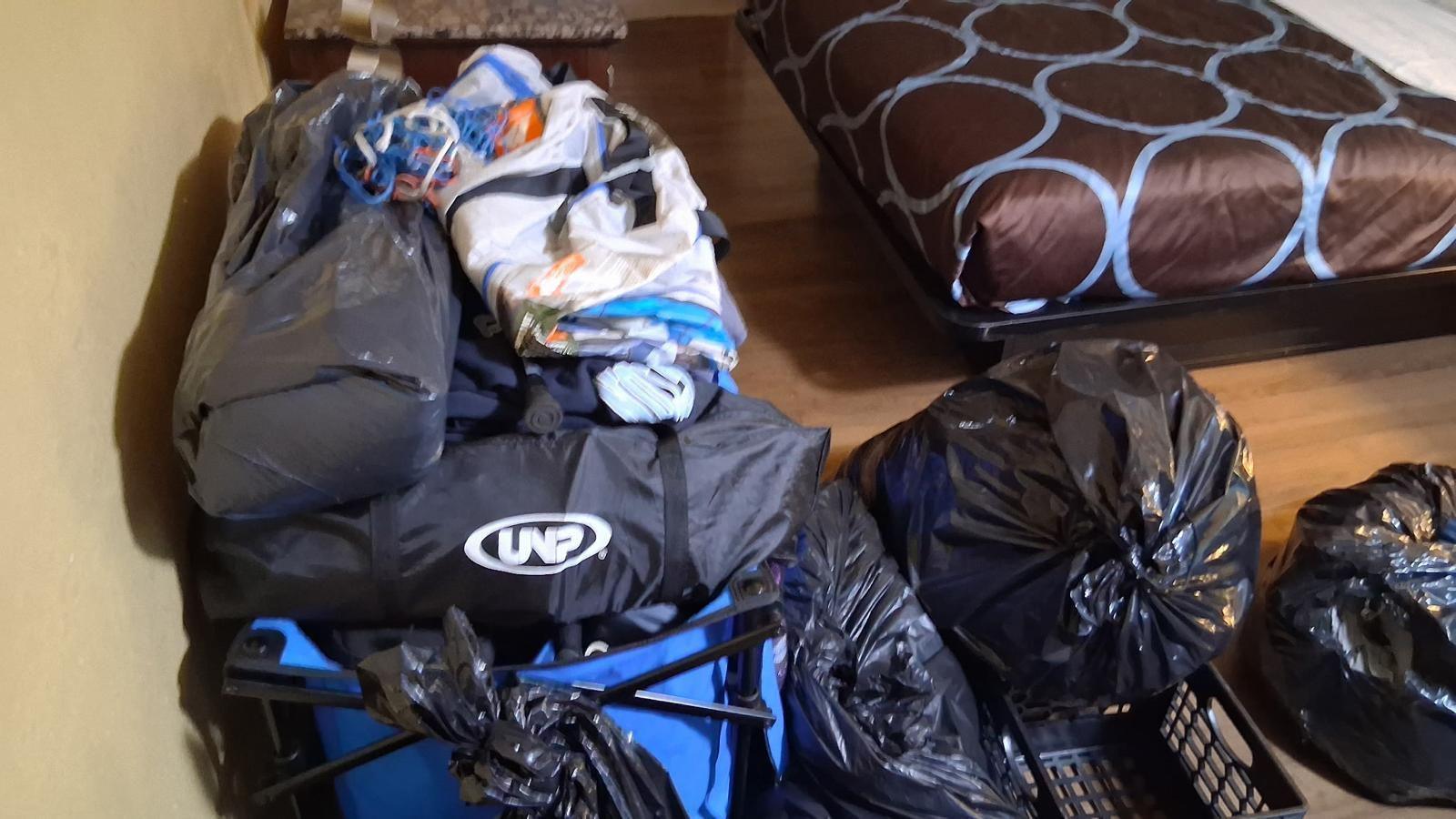
Mr Theodie piled his tent and other belongings into a motel room following the encampment being closed
Mr Theodie said he will try to find a new spot when he checks out of the motel: "My best option is to try to find a safe place to set my tent up. I don't know where that's going to be, but I would like to stay in DC."
I also met George Morgan, a 65-year old from Washington DC, at the encampment. He said he had only been living there for two months, after he had to move out of an apartment he could no longer afford.
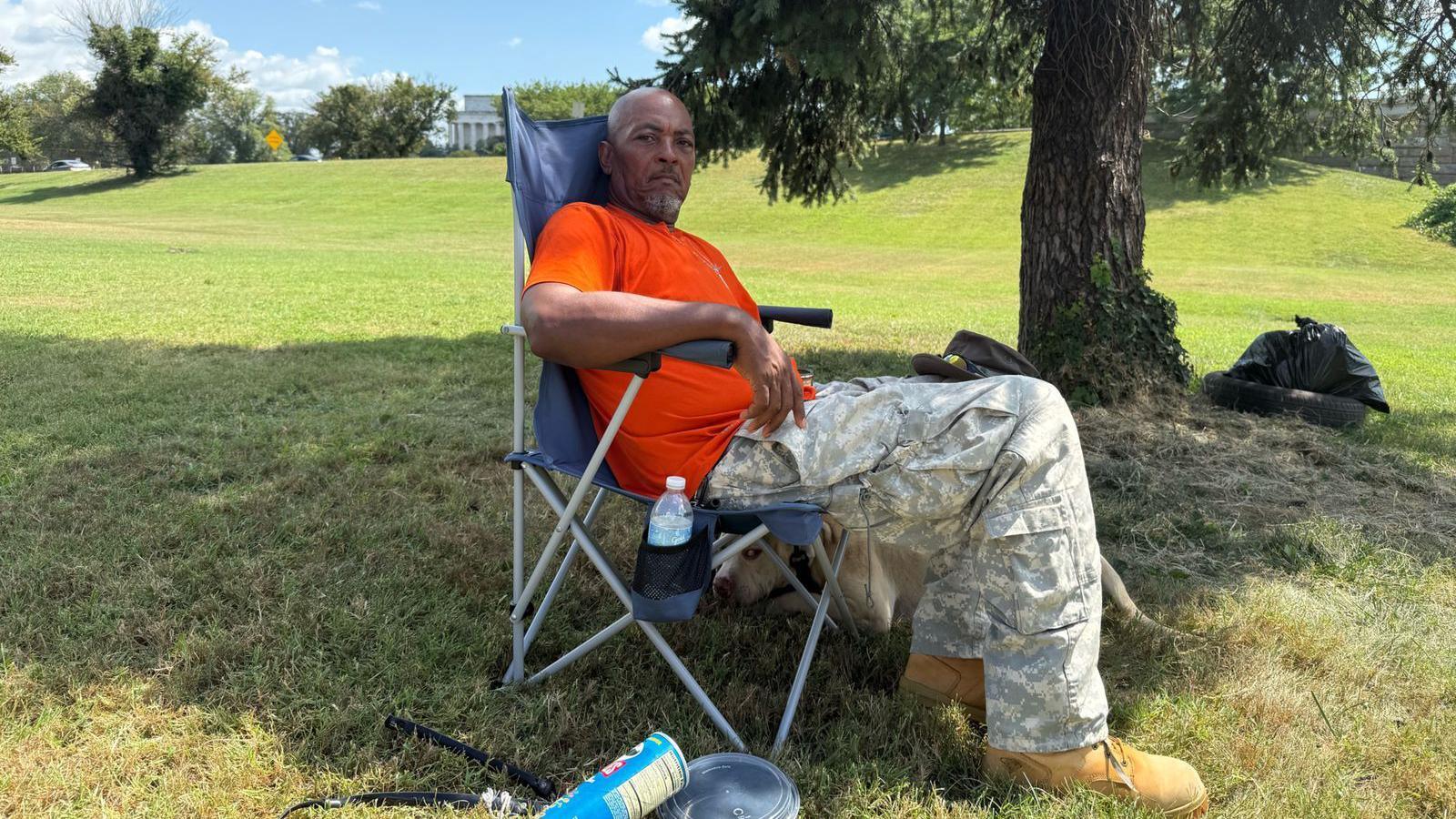
Mr Morgan says he spent his last money to make sure his dog could stay with him in a motel
When I called to see what had happened to him after the encampment was removed, he was in a motel reception area with his dog, Blue, after someone covered the cost of a night there for him too.
"We're sitting here to see if we're able to get another night. I had to pay $15 dog fee - which was the last money I had."
When I last spoke to Mr Morgan, he had been able to extend his stay at the motel through the weekend - but said he didn't know what next week would bring.
"I have to play it by ear as I have no money. God has always come through, so I'll see what God sets up next."
